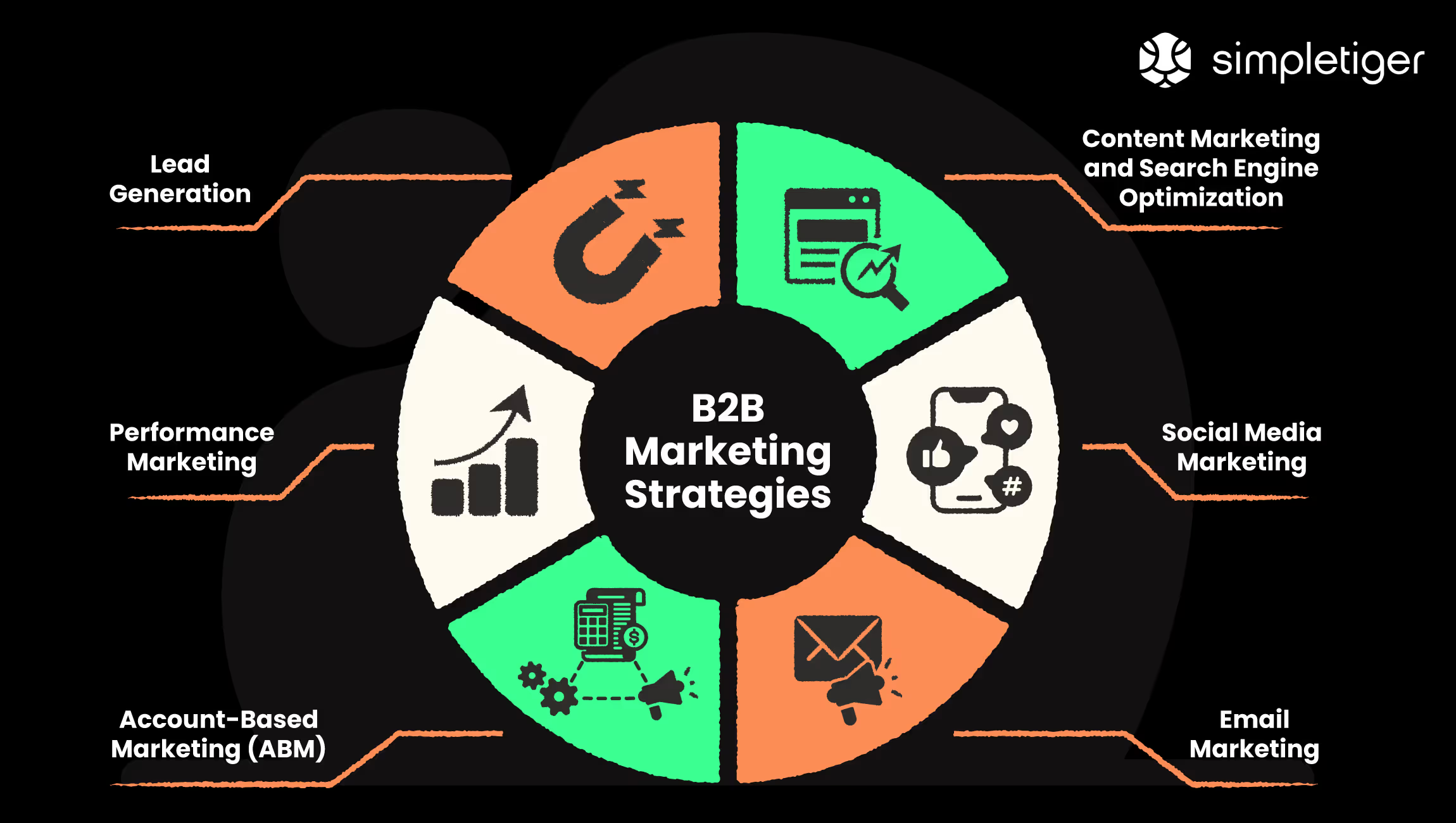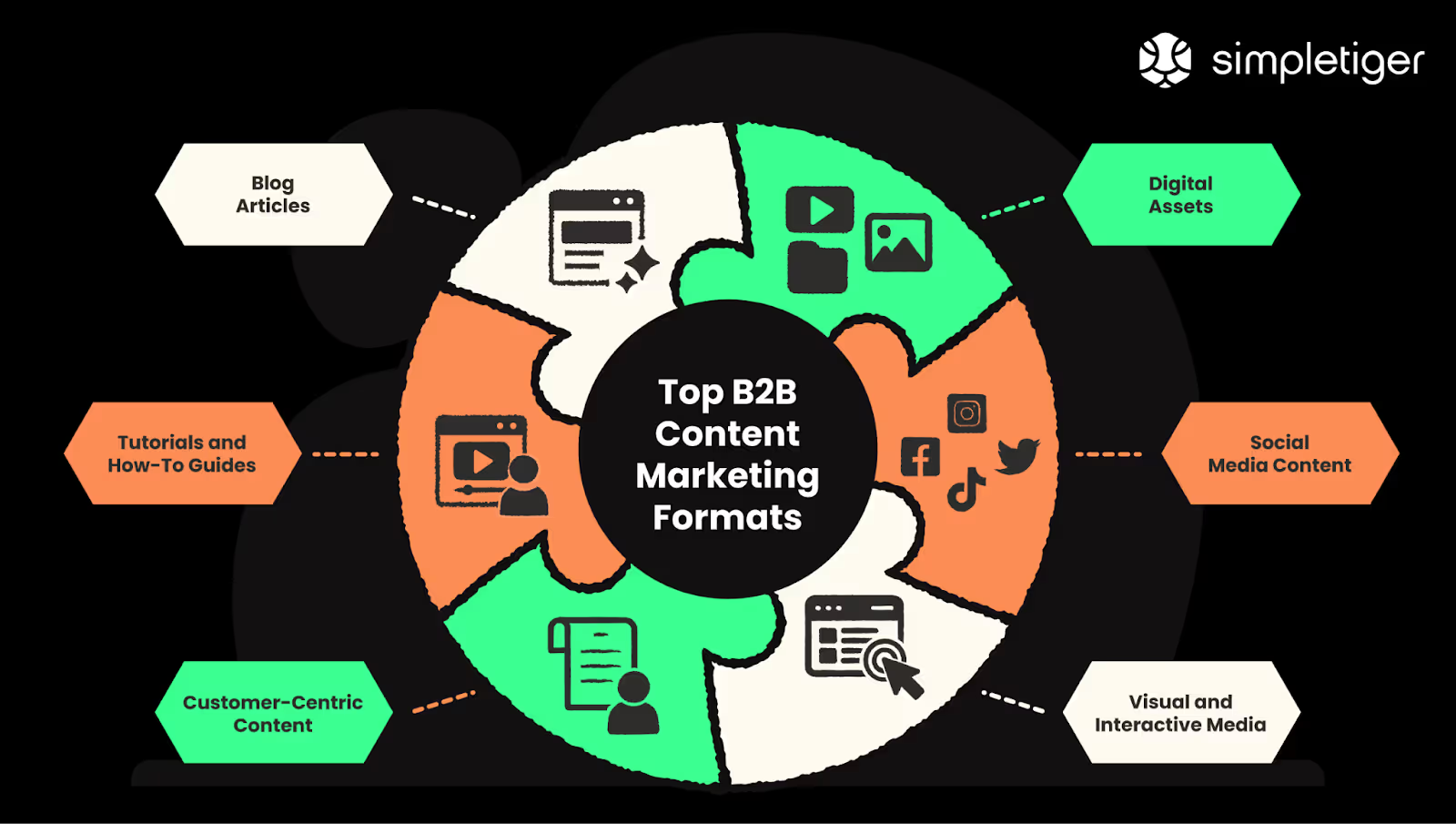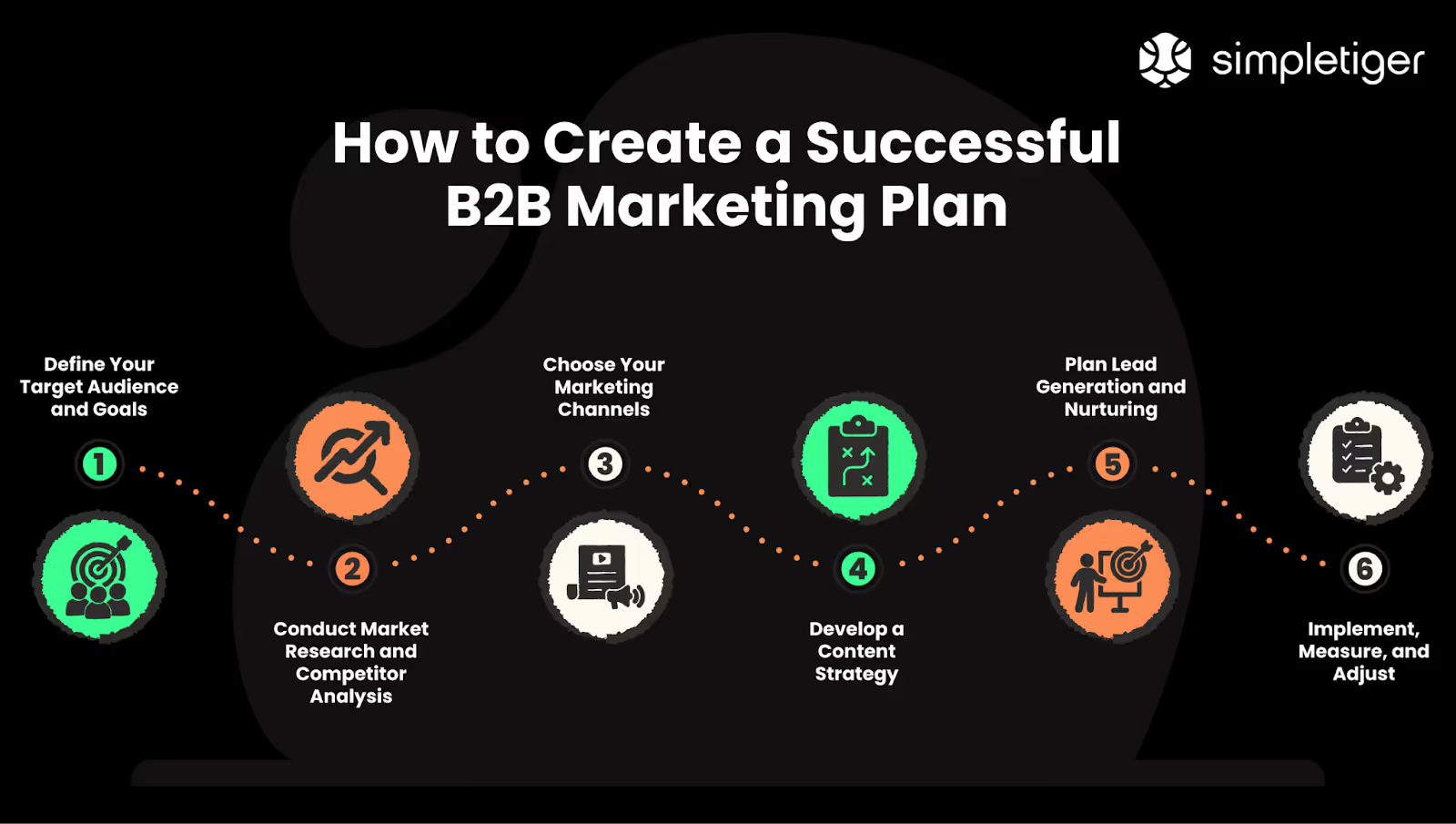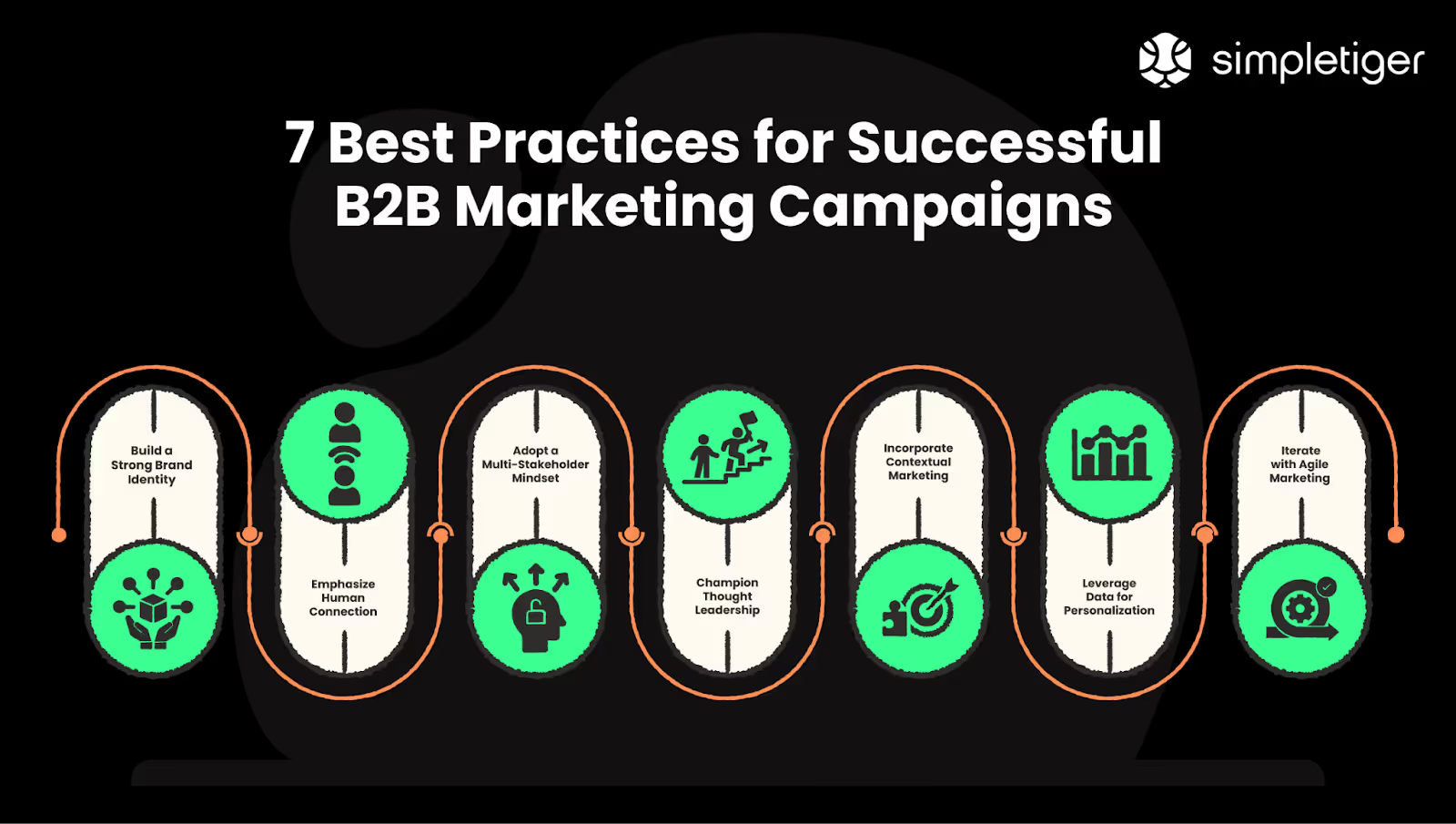Download the SaaS SEO Guide PDF
Over 60+ page SaaS SEO Guide in PDF format so you can read it whenever you want!



Over 60+ page SaaS SEO Guide in PDF format so you can read it whenever you want!






In the fast-paced world of Software as a Service (SaaS), it's all about growth and staying ahead of the game. And when it comes to grabbing that spotlight, B2B marketing takes center stage. If done correctly, some creative B2B marketing moves can take your business to new heights.
So, why not take a closer look into B2B marketing? Let's uncover some truly insightful strategies for business growth that could be just the edge you need.
B2B marketing is the practice of one business marketing its products or services to another. Unlike B2C or business-to-consumer marketing, where organizations deal directly with end consumers, B2B marketing involves selling to other businesses. This dynamic influences the strategies, tactics, and messaging used in B2B marketing campaigns.
In the business world, marketing strategies can differ dramatically depending on your target audience. Business-to-business (B2B) marketing involves selling products or services directly to other companies. This typically involves long-term relationships and a focus on logical process-driven purchasing decisions. Successful B2B marketing hinges on understanding the needs, pain points, and buying behavior of business customers to shape persuasive solutions.
On the other hand, Business-to-Consumer (B2C) marketing focuses on selling to individual consumers. Decisions are often driven by emotions and personal preferences. Understanding these core differences between B2B and B2C marketing is the first step towards crafting an effective and efficient marketing strategy tailored to your business needs.

Ready to master B2B marketing for substantial growth? Hold on tight as we dive into key strategies that will help you achieve your business goals within the B2B landscape.
Generating quality leads is pivotal to B2B marketing. It's about attracting businesses who may benefit from your product or service and compelling them to show interest. This encompasses a variety of methods, such as networking at events, creating valuable lead magnets, and optimizing your website for conversions. The end goal is to convert these leads into loyal customers.
Through B2B content marketing, you engage potential clients with valuable insights, positioning your company as an industry leader. Combining SEO with content marketing makes your content easily discoverable on search engines, attracts more qualified leads, and drives organic growth for your SaaS business.
B2B social media marketing leverages platforms like LinkedIn, Twitter, and Facebook to create brand awareness, engage with customers, and generate leads. By sharing valuable industry insights and content, B2B companies can attract and retain their target audience, enhancing brand loyalty and driving business growth.
In B2B marketing, email remains a potent force. It's an ideal platform for fostering partnerships, delivering informative resources, and consistently communicating with stakeholders. With meticulously crafted messages, personalization, and careful timing, businesses can nurture leads, affirm their expertise, and improve their bottom line significantly.
Account-Based Marketing (ABM) is a strategic B2B approach to align marketing and sales efforts directly with key business accounts. ABM opens the door for personalized marketing strategies with higher rates of customer retention and revenue. It's like using a scalpel instead of a broadsword - by focusing on quality over quantity, businesses can cultivate deeper relationships with high-value clients.
B2B Performance Marketing harnesses data analysis and targeted marketing to achieve measurable results. The key is tracking and optimizing all marketing efforts to generate the greatest return on investment. Be it ads, SEO, or email campaigns, every marketing avenue you opt for is strategically measured and optimized to help attain your business objectives faster.

Blog articles are essential to B2B marketing, offering a platform to share industry insights, trends, and thought leadership. These pieces not only inform your audience but also boost your SEO efforts, drive traffic, and generate leads. An effective blog strategy focuses on delivering valuable, engaging content that resonates with your target market.
When we talk about digital assets in B2B marketing, we're referring to items like infographics, eBooks, whitepapers, or videos - essentially any online content that adds value to your audience's experience. These assets are crucial for capturing interest, imparting valuable knowledge, and driving engagement with your brand.
Social media content for B2B marketing needs to be targeted, personalized, and valuable. Embed your brand personality through engaging posts, connect with your audience, and remember to keep a consistent strategy across all platforms. Stay relevant and be a trustworthy resource for your customers.
Visual and interactive media present an exceptional opportunity in B2B marketing. It involves leveraging webinars, infographics, video content, and interactive modules. These forms of media are highly engaging and often hold the viewer's attention longer than traditional, static content.
To build meaningful customer relationships, B2B marketing can't overlook the power of customer-centric content. This type of content is tailored to the specific issues, needs, and buying stages of your prospects. By focusing on providing solutions to their challenges, you can boost engagement and achieve higher conversion rates.
A compelling guide doesn't merely deliver facts—instead, it walks readers step-by-step toward understanding or achieving something. Think of these as a roadmap leading your customers down a path of knowledge and proficiency.
These tools can have a profound effect on your user engagement, providing in-depth knowledge about your product or service and positioning your brand as an industry expert.

Unlocking the potential of B2B business growth starts with a well-defined marketing plan. Here's a step-by-step guide for creating a successful B2B marketing plan that maps your path to meaningful results.
Your marketing endeavors should start by pinpointing your ideal customer profile. This involves much more than just knowing the industries or companies you're targeting. You must also dive deep into their demographics, psychographics, and pain points. Simultaneously, establish tangible, clear goals for your marketing campaign that align with your broader business objectives.
Understanding your market and competition is crucial in B2B marketing. Market research provides insights into your audience's needs, preferences, and pain points. Similarly, competitor analysis helps you understand your competition's tactics, strengths, and weaknesses. Both deliver critical information that informs your marketing strategy and helps differentiate your offering in a crowded marketplace.
Identify where your target audience spends most of their time online to prioritize your marketing efforts effectively. Evaluate each channel's potential to reach your audience and align with your goals. Consider marketing channels like SEO, PPC, email, social media, and content marketing to diversify your strategy.
Creating a potent content strategy involves crafting valuable, engaging content tailored to your ideal customer's wants and needs. This process includes understanding your audience, researching trending topics, and consistently producing high-quality content. The right content attracts, engages, and converts B2B leads, driving revenue for your company.
Creating effective lead generation hooks, such as compelling CTAs or value-rich content, will help you attract potential clients. Once these leads are captured, nurture them through targeted follow-ups and personalized communication. This smooth transition from interest to engagement is key to maintaining a robust and healthy sales funnel.
When implementing your marketing plan, it's vital to measure your efforts consistently. Set targets, use analytics tools, and track KPIs to gauge the effectiveness of your strategies. Be ready to adjust your plan, honing what's working and tweaking or abandoning what's not. Grab opportunities for iterative improvement to maximize your B2B marketing outcomes.

From building a robust brand identity to leveraging personalized data, discover how these strategies can optimize your efforts and yield substantial results for your business growth.
A brand identity is more than just a logo; it encompasses your company's mission, values, and vision, providing a comprehensive profile of who you are as a business. Your brand identity influences customers' perceptions, inspires trust, and serves as a beacon that distinguishes your products and services from competitors in the marketplace.
Carefully build your brand's personality and let it tell your business's unique story.
Nurturing human connection in B2B marketing can make a big difference. It’s not just about brand-to-business, it's about person-to-person. Creating genuine relationships and showing empathy can significantly bolster client retention and engagement rates.
Don't forget that behind every business is a team of people making decisions. Connect with them on a personal level and watch your marketing efforts yield desired outcomes.
Engaging in B2B marketing necessitates a multi-stakeholder mindset. It's integral to recognize the interests and viewpoints of all parties involved. Remember, you're dealing not just with one individual but an entire organization.
Understanding various roles, decision-making processes, and company cultures can strengthen relationships and allow for a business approach that tackles multiple needs. Ultimately, this mindset cultivates successful long-term partnerships, ensuring your B2B marketing strategy is balanced and comprehensive.
Positioning your company as a thought leader is crucial to B2B marketing. Thought leadership builds trust, proving you're more than a business seeking profit – you’re a valuable source of innovative ideas and knowledge.
To achieve this, generate enlightening, expert content on industry trends and new advancements, offering unique insights. Attend and speak at industry events or host webinars and podcasts to drive conversation and spark interest and engagement within your industry and beyond.
Contextual marketing is all about providing a personalized experience to your audience by delivering targeted and relevant content. It involves understanding the context in which your customers operate and tailor your messaging accordingly.
The result? A seamless, engaging experience that feels almost tailor-made to each client, driving stronger, more profitable customer relationships.
Personalization is a critical component of effective B2B campaigns, and it's impossible without data. Utilize insights from customer interactions, feedback, and preferences to individualize your messaging and offerings.
By tailoring your approach to satisfy specific needs, you build a stronger rapport with your audience, leading to increased loyalty and engagement. Remember, a one-size-fits-all approach feels impersonal - don't be that company.
In today's fast-paced digital landscape, adopting agile marketing is crucial. It focuses on iterative testing campaigns, measuring performance, and implementing changes swiftly. This promotes efficiency and adaptability in your B2B marketing strategy.
Instead of sticking with a rigid plan, agile marketing encourages alterations based on performance data, customer feedback, and market trends, ensuring your strategy stays ahead of the game.
SimpleTiger brings a unique approach to B2B marketing strategy, offering innovative solutions tailored to your specific needs. By harnessing the power of SEO, PPC, and creative content marketing, we help SaaS companies like yours achieve remarkable growth.
Don't just take our word for it - join countless satisfied clients by elevating your strategies with us. Book a discovery call now to experience first-hand how SimpleTiger can transform your B2B marketing and propel your business growth.

Siobhan is a Content Strategist at SimpleTiger, responsible for ideating, planning, outlining, optimizing, and iterating content for clients.
Over 60+ pages detailing how to grow your SaaS company using a proven SEO process.


Schedule a Discovery Call and see how we've helped hundreds of SaaS companies grow!



